|
Biographical Log of Michael Furstner - Page 198
09 | 10 ||
2011 :
Jan |
Feb |
Mar |
Apr |
May |
Jun |
Jul |
Aug |
Sep |
Oct |
Nov |
Dec || Page :
Previous |
Next
The Martinshof Story -
A Philosophy of Happiness -
Life Awareness -
Maps & other Text series
Most Recent -
Next -
Previous -
Page 1 -
Photos -
MP3s -
Maps & Text series -
Jazclass
Monday & Tuesday, February 21 & 22 2011
(diary)
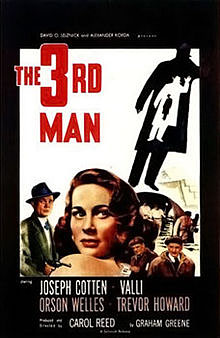 Interrupting briefly my stay in bed (trying to get over my cold) I rushed to the
Maroochydore Library for some more reading material and I was lucky to strike gold!
Interrupting briefly my stay in bed (trying to get over my cold) I rushed to the
Maroochydore Library for some more reading material and I was lucky to strike gold!
Graham
Greene's little known novella No Man's Land, written 60 years ago (in 1950)
but only published recently (bundled with another novella from that period The
Stranger's Hand), in 2005.
Greene's first thriller movie about the espionage during the Cold War, The Third Man, in 1949 was a fantastic success. I remember it well
and I performed its signature tune, the Harry Lime motive, at many accordion
band performances on stages in small towns throughout the Dutch Achterhoek (region on the map East of the IJssel ).
Greene was therefore keen to produce another movie. Instead of writing a script
directly he first wrote a small novella to outline the foundation of the story and mood
of the film. This became his novella No Man's Land. But because it was another
spy thriller in a very similar mood to "The Third Man", it was rejected by the
Director, Carol Reed (not merely wanting to replicate his previous success). The
script was archived and gathered dust until finally published in 2005.
Meanwhile Greene was not discouraged, but wrote another novella, The
Stranger's Hand (yet another Cold War spy story), which in 1954 was produced as a movie this time by the Italian
director Mario Soldati. Two of the stars from "The Third Man", Trevor Howard and
Alida Valli
also performed in this movie.
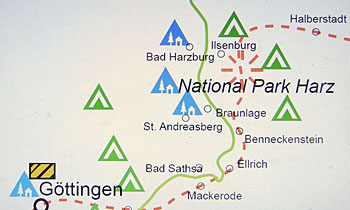 So the three stories form a sort of trilogy (with the unpublished "No Man's Land' in
the middle) reflecting the mood and tension of the early years of the Cold War
between East and West, set in three ambivalent locations Vienna (The Third Man), the
Harz mountains around Braunlage (No Man's Land) and Venice (The Stranger's Hand).
So the three stories form a sort of trilogy (with the unpublished "No Man's Land' in
the middle) reflecting the mood and tension of the early years of the Cold War
between East and West, set in three ambivalent locations Vienna (The Third Man), the
Harz mountains around Braunlage (No Man's Land) and Venice (The Stranger's Hand).
The espionage angle of No Man's Land focuses on the transfer of spied
information about the discovery of Uranium near Ilsenburg. The moral and
emotional "message" of the story, which also contains a strong romantic angle, is that
love can not exist without honesty and trust.
This perspective places No Man's Land also as a bridge between two of Greene's
great romantic novels, The Heart
of the Matter, written just before, and The End of
the Affair, published just after "No Man's Land".
These three works, seen
together, are considered to perhaps reflect some of the emotions and frustrations of
Graham Greene during this period of his personal life when he had a love affair with
Catherine Walston. Aspects of the latter may be reflected in the characters Clara (No
Man's Land) and Sara (The End of the Affair).
All in all, No Man's Land is a
lovely novella which should not be missed by any Graham Greene fan.
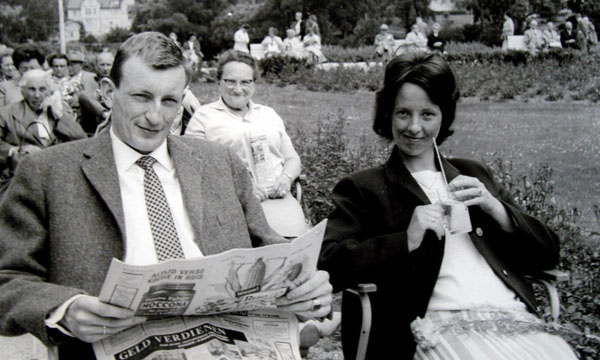 Finally the location for "No Man's Land", Braunlage, resonates especially with
me personally. It was the place where my mother in her early years followed a ladies
grooming course and where my father frequently met her while they were courting.
Finally the location for "No Man's Land", Braunlage, resonates especially with
me personally. It was the place where my mother in her early years followed a ladies
grooming course and where my father frequently met her while they were courting.
After the war (from the late 1950s onwards) they regularly went there for their
annual holidays. My father was so enthusiastic about the place that he managed to talk
me into having my own honeymoon there. And we did in June 1963.
What I did not realise (as far as I can remember) at the time was, how close Braunlage was
to the Iron Curtain, barely 1 km away. At the time of Greene's novel, the Iron
Curtain was not much more than a ditch or line of tree stumps which was patrolled by
border guards of either side and numerous refugees managed to cross the line rather
safely from East to West. (In fact Greene himself went across and back as part of his
research at the time).
When we were there (in 1963) the Iron Curtain had of course
been fully fenced off, by two barbwire fences, several meters high, separated by a 100
meters wide strip cleared of all vegetation, converted into a barren and lethal mine field. (See also my Army days
story of our NATO exercises alongside the Iron Curtain 50 km North of Braunlage.)
Most Recent -
Next -
Previous -
Top -
Page 1 -
Photos -
MP3s -
Maps & Text series -
Jazclass
Wednesday - Friday, February 23 - 25 2011
(diary)
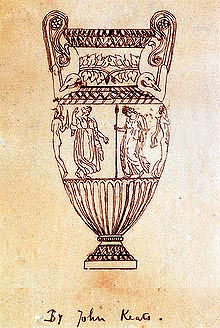 When one reads (or hears) an interesting quote or idea it immediately takes on a new
life through the individual perspective of the reader, regardless of its original context
and meaning. Take this one for example (from the famous Ode
on a Grecian Urn by John Keats, 1819).
When one reads (or hears) an interesting quote or idea it immediately takes on a new
life through the individual perspective of the reader, regardless of its original context
and meaning. Take this one for example (from the famous Ode
on a Grecian Urn by John Keats, 1819).
Heard melodies are sweet, but those unheard
Are sweeter . . .
.
For the first half of my life listening to music ("Heard melodies are sweet") was an absolutely essential part for
my well being and happiness. In my early teens (just after WW2) I would be sitting all
ears next to the radio of Regien
(my Grandmother's housekeeper) listening to music at every free moment of my day. Even late at night when
I listened to the midnight Jazz hour of the Voice of America (which always
opened with a big band arrangement of Duke Ellington's Take the A train).
So I was
absolutely devastated when my Grandmother eventually left our home Martinshof, taking
Regien and her radio with her.
It was not long however before we had our own radio, followed by a 78 rpm record player on which I could listen to Winifred Atwell's Black and White Rag (which soon after I performed as accordion solos on stage myself), Leroy Anderson's Blue Tango and The World is waiting for the Sunrise by Les Paul and Mary Ford. What a wonderful time I had!
From then on it
were not only the radio, but especially records (later tapes and CDs) I listened to all day. My very first 33 rpm LP was Fontessa by the Modern Jazz Quartet, I loved it. This continued
until my mid 40s, when inexplicably, sometime during, or shortly after, my studies in
music at Adelaide University I had a dramatic turn around.
I stopped listening to music on the radio, no longer played my CDs, preferring instead
the "sweetness" of undisturbed silence.
Why is that?
It has always puzzled me, although I also felt that (somehow) it was a foreward step
in my development towards a more mature, unique individual.
Another quote comes to my mind as I think about this today, this time it is one by Stendhal.
Beauty is the promise of Happiness
Wonderful, I agree. But what (it occurs to me now) happens when Beauty's promise of
happiness has actually been fulfilled? It appears that in my case it has (as far as it concerns music), because listening to music is no longer essential (or even desirable) for my happiness. The job has been successfully completed, it has therefore become
superfluous. These days I really prefer the silences, the greater "sweetness of unheard melodies".
 Where is this heading to? I ask myself. Is this going forward? I believe so.
Where is this heading to? I ask myself. Is this going forward? I believe so.
I enjoy being surrounded by nature, like for example on the rear veranda of
ThreePonds, listening to (or rather vaguely perceiving) the subtle breathing of nature :
rustling leaves, the gentle rush of rain, the soft murmuring of the waterfall, only broken by the occasional
bird voice.
Or even quietly reading my paper at the Surf Club, where the soft hum hum of the collective
voices act (provided no clear words are heard) as a soft carpet for my wandering
mind.
For me this is the ideal environment for contentment, happiness to
unfold. A harmonious quietness, which Thomas Hardy (in
his novel "Desperate Remedies") so eloquently expressed to become (in its ultimate state) :
an all pervasive stillness where any thought by the mind is almost perceived as a real physical action.
Perhaps that will be the final (emotional and mental) destination one may arrive at, provided one lives long enough.
Most Recent -
Next -
Previous -
Top -
Page 1 -
Photos -
MP3s -
Maps & Text series -
Jazclass
Saturday - Monday, February 26 - 28 2011
(diary)
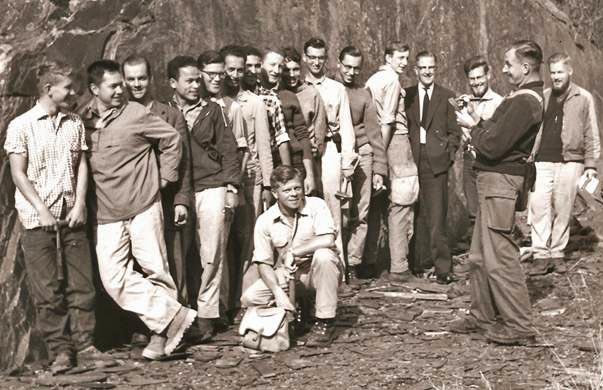 Reading my previous entry the thought may have struck you "Is
this guy really a musician?"
Reading my previous entry the thought may have struck you "Is
this guy really a musician?"
My immediate answer would be "No, I am not, and I have never really been one."
Likewise I don't think I have ever really been a geologist either.
Unlike music, in which I had a keen interest during my teenage years, I could not
care less about geology. I did not collect stones, fossils, minerals, or gem stones and
in fact hardly was aware of this branch of science. I more or less got accidentally
into it after completing high school.
But studying geology proved to be not a bad choice for me, I loved the
fieldwork summers in Spain each year, enjoyed the mental stimulations I could find in
that science and the profession helped me to escape Europe and move to Australia. Once
in Australia I tried very hard to find my place in that profession and in the span of
14 years I worked for 7 different companies in various capacities but never felt
settled and happy in any of them.
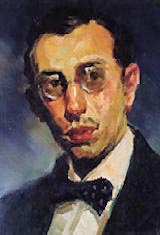 My switch to music was great and I enjoyed it enormously, but as my teacher Graham
Williams noted, I was not a musician and never would be one. This was not due
to a lack of skills, determination or creativity. No, I was doing in fact great in
terms of all those aspects, and over the years have made substantial contributions to
music. But I simply did not have the right mind set to belong.
My switch to music was great and I enjoyed it enormously, but as my teacher Graham
Williams noted, I was not a musician and never would be one. This was not due
to a lack of skills, determination or creativity. No, I was doing in fact great in
terms of all those aspects, and over the years have made substantial contributions to
music. But I simply did not have the right mind set to belong.
This is in fact the key to my nature and all my life's activities. I never
wanted to be pinned down within one permanent environment, be it a place, a
social community or indeed a profession. I have always endeavored to make positive
contributions in every context I found myself in, but I always took great care never to
become a fixture in it, never to belong.
I always felt, as the Russian composer
Igor
Stravinsky expressed it so well, that :
"To continue in one direction is to go
backwards."
And I have never done that. To lead a permanent, mono dimensional, monochromatic life
does not agree with my nature. Once I was perhaps part of a small minority, but the modern world is changing rapidly now. Young people increasingly move all over the
world working in different environments and in different disciplines. And that, as I
see it, is a very good thing.
Comments -
Most Recent -
Next Page -
Previous -
Top -
Page 1 -
Photos -
MP3s -
Maps, Text series -
Jazclass
Copyright © 2011 Michael Furstner
|






 My switch to music was great and I enjoyed it enormously, but as my teacher Graham
Williams noted, I was not a musician and never would be one. This was not due
to a lack of skills, determination or creativity. No, I was doing in fact great in
terms of all those aspects, and over the years have made substantial contributions to
music. But I simply did not have the right mind set to belong.
My switch to music was great and I enjoyed it enormously, but as my teacher Graham
Williams noted, I was not a musician and never would be one. This was not due
to a lack of skills, determination or creativity. No, I was doing in fact great in
terms of all those aspects, and over the years have made substantial contributions to
music. But I simply did not have the right mind set to belong.